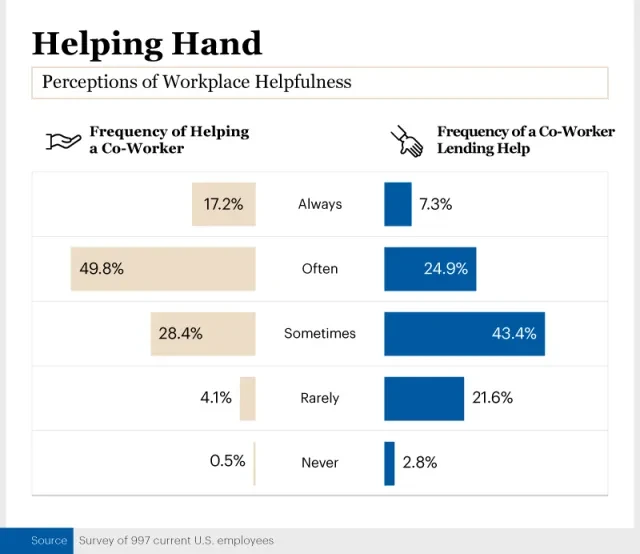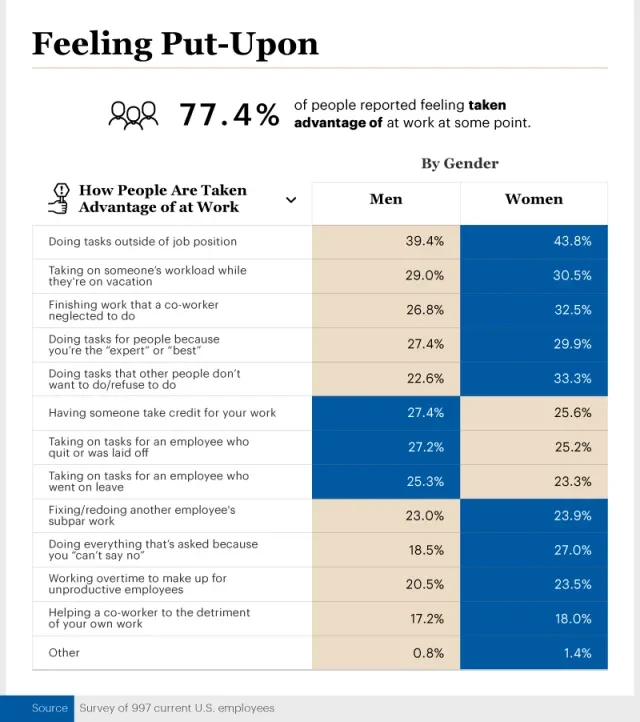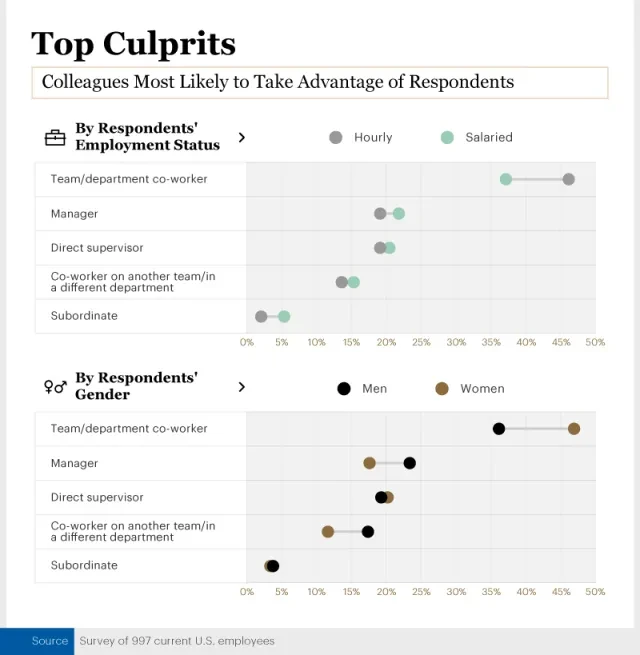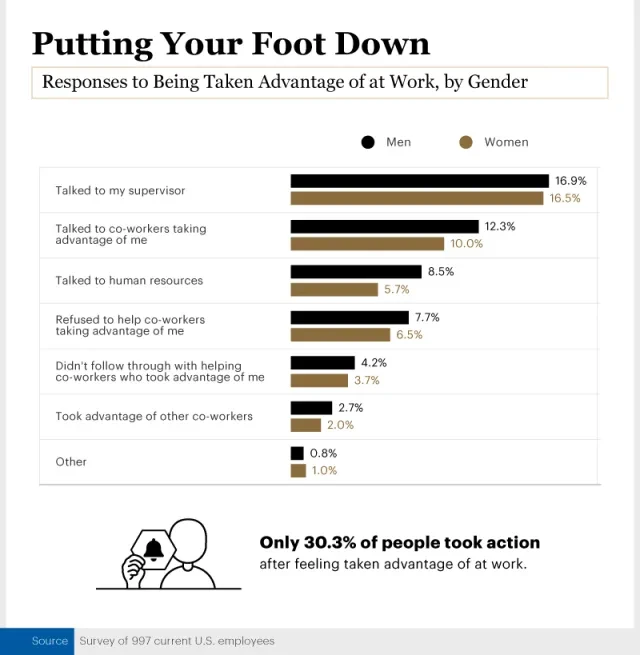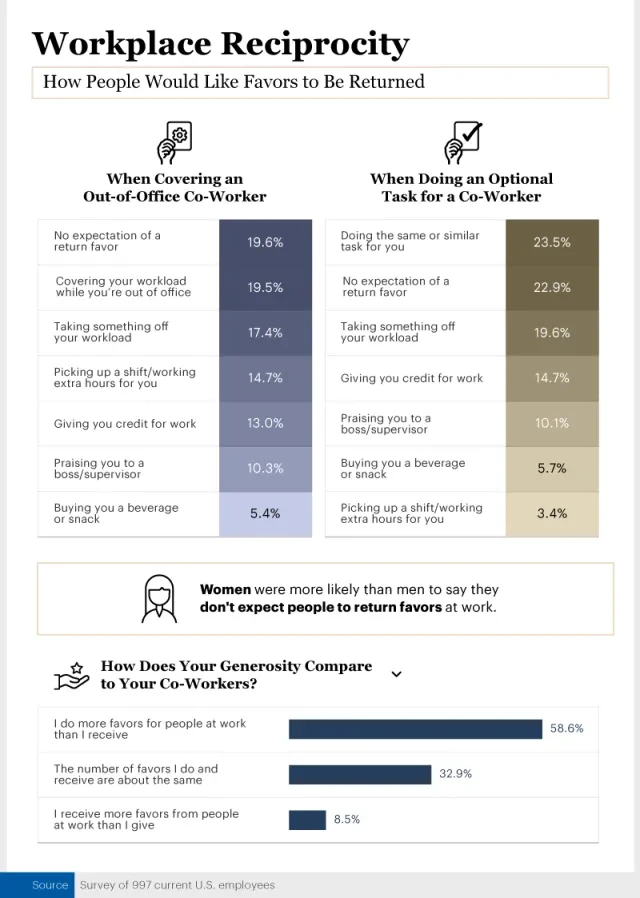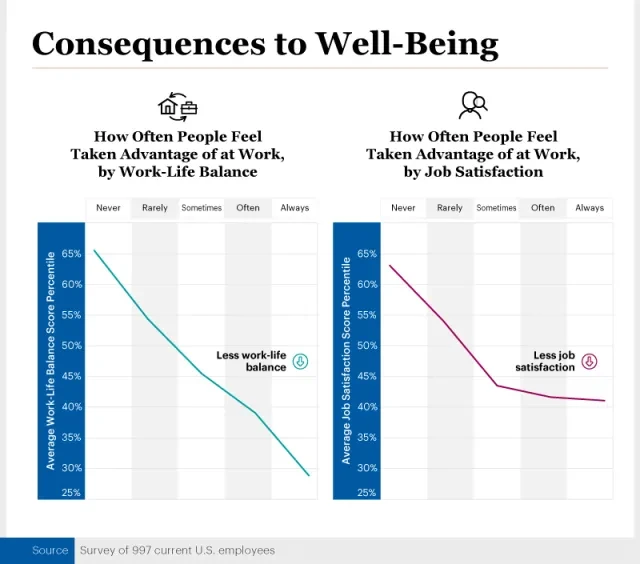Office culture varies by company and industry, but at some point, most employees will have to work together. While teamwork is foundational to many workplaces, there are often go-to people who pick up the slack. Whether it’s the extra work brought on by colleagues taking a vacation, someone being terminated, or a co-worker going on leave, employees can sometimes feel taken advantage of if the favors they do aren’t returned.
Covering for others may help the team succeed, but what effect does it have on work/life balance and job satisfaction? We surveyed nearly 1,000 current employees about their perceptions of lending a helping hand and possibly being taken advantage of at work. Keep reading to see how employees are being exploited and what some are doing about it.
Giving and receiving
Collaboration is an important element of many workplaces, particularly as younger generations report spending more time working collaboratively. In our study, we found that almost 50% of employees claimed to help their co-workers often.
Interestingly, though, people were significantly more likely to say they helped a co-worker often or always compared to receiving help from co-workers. Instead, 43.4% of employees said their co-workers helped them sometimes, and 21.6% reported rarely receiving help. This discrepancy could be due to self-serving bias, which leads people to think better of themselves than others and that their actions are exceptional compared to their peers.
Adding to the to-do list
Given that people tend to think they help others more than they are helped themselves, it makes sense that 77.4% of employees reported feeling taken advantage of at work at some point. Across both genders, people were most taken advantage of by doing tasks outside of their job position, taking on someone’s workload while they went on vacation, and finishing work that a co-worker neglected. While men were slightly more likely to report someone taking credit for their work and taking on work for an employee who quit, got fired, or went on leave, women were more likely to feel taken advantage of in other ways.
This can boil down to gender stereotypes and differences in the workplace. Not only are women more likely to offer help at work, but also they are more likely to be assigned “office housework,” or less important tasks that others don’t want to do, and are expected to help more than their male counterparts. Of course, women offering help doesn’t necessarily mean they want to help — gender stereotypes can make women feel they need to offer assistance to avoid being labeled selfish or not a team player.
Position of power
Being friendly with co-workers and superiors can help the office run smoothly, but there is a fine line between helping a co-worker in need and becoming a doormat. When the line is crossed, asking for favors can happen more frequently and saying no can be more difficult. However, co-workers on the same team or in the same department were the most likely to take advantage of others, with hourly employees experiencing this the most.
A majority of salaried employees also reported their direct co-workers taking advantage of them as well, but they were more likely than hourly workers to report feeling taken advantage of by management, their direct supervisors, co-workers from another department, and their subordinates. Superiors may take advantage of salaried employees rather than hourly workers due to it costing less. While adding extra work to an hourly employee’s plate can result in overtime pay, salaried employees get paid the same regardless of how much they work — even if they put in extra hours.
When it came to gender, the same patterns emerged. Co-workers on the same team or in the same department were the top culprits. Women were slightly more likely to report being taken advantage of by their direct supervisor, while men were more likely to report feeling taken advantage of by management, co-workers from another department, and their subordinates.
Setting boundaries
Once it’s clear that employees are being taken advantage of, what can they do about it? Nearly 17% of men and 16.5% of women talked to their supervisor about it, while 12.3% of men and 10% of women confronted the source themselves. Men may have been more likely to take action after being taken advantage of, but for both genders, responding to the situation at all was fairly uncommon.
For some, this could be due to the fear of appearing as a complainer or wanting to avoid confrontation. However, there are plenty of ways to set boundaries without appearing argumentative or confrontational.
Do for them as they do for you
Helping a co-worker doesn’t always mean being taken advantage of. When a co-worker is out of the office, covering for them may only be temporary. But when they do return to work, how do employees want their efforts reciprocated? Our survey found that most people don’t expect colleagues to return the favor at all. Even when vacation or leave wasn’t a part of the equation, 22.9% of people didn’t expect a co-worker to return the favor when they did an optional task.
If people wanted the favor returned, 19.5% would want their co-worker to cover their workload while out of the office. And for those doing an optional task, 23.5% would want their co-worker to do the same or similar task in return.
Nearly 60% of people believed they did more favors for people at work than others did for them. Again, while this belief could be rooted in self-serving bias, the fact that most people feel the need to return a favor suggests co-workers may not know how to reciprocate efforts – especially if they’re not expected to.
Hindering happiness
Finding and having high job satisfaction are both crucial to mental and physical health. While doing favors for people can increase our own happiness, being taken advantage of at work can cause work/life balance and job satisfaction to plummet. Those who said they always felt taken advantage of at work had the lowest work/life balance score and the lowest level of job satisfaction, while those who never felt taken advantage of had the highest scores.
Of course, taking on the work of others is likely to cut into personal time, and not having your efforts reciprocated can make for a strained working environment. But putting your foot down, saying “no” more often, and even asking for favors in return can help bring about a better balance.
Healthier work environment
Occasionally helping a co-worker can be beneficial to the team, but when favors continue without reciprocation, employees can feel taken advantage of. Whether it’s for a co-worker or superior, picking up the slack by doing tasks outside of your job description or taking on someone’s workload while they are away can negatively impact work/life balance and job satisfaction — both of which can bring down office productivity.
Ensuring your business is a safe and healthy environment where employees feel equally heard and respected is vital to success. At Paychex, we offer a variety of services from payroll processing to fully outsourced human resources solutions to help cultivate a positive working environment that supports your company’s vision, culture, and values. To learn more, visit us online today.
Sources
- Brough, Paula & Timms, Carolyn & Sarah Bauld, Rosie. (2009). Measuring work-life balance: Validation of a new measure across five Anglo and Asian samples.
- Iverson, R. D., Olekalns, M., & Erwin, P. J. (1998). Job Satisfaction Scale [Database record]. Retrieved from PsycTESTS.
- Teamwork, social events and company culture are vital to happiness at work, The Guardian, 2017.
- My Boss Expects Me to Pick Up My Co-Workers’ Slack, Inc., 2017.
- Taking Advantage: Exploring How People Feel Exploited at Work, Paychex, 2019.
- 12 Types of Cognitive Bias That Influence Your Thinking, Verywell Mind, 2025.
- 7 Psychological Biases You Need to Understand to Become a Stronger Person, Forbes, 2018.
- Are Women Penalized for Being Team Players, Forbes, 2018.
- For Women and Minorities to Get Ahead, Managers Must Assign Work Fairly, Harvard Business Review, 2018.
- Study Proves Women Get Screwed Over at Work, Bustle, 2013.
- Not Very Likeable: Here is How Bias is Affecting Women Leaders, Forbes, 2018.
- Salary vs. Hourly Pay: What’s the Difference?, Investopedia, 2025.
- Workers Put in 23 Extra Hours a Month Just to Get Noticed, Study Says, Inc., 2019.
- 3 Kinds of People Who Will Take Advantage of You at Work—and How to Respond to Each One, The Muse, 2020.
- 5 things you should do if someone in the office is unloading their work onto you, Business Insider, 2017
- 7 ways to ensure people don't walk all over you at work, Business Insider, 2017.
- What Is Reciprocity?, Verywell Mind, 2025.
Methodology
We surveyed 997 current employees about their experience with being taken advantage of at work. Respondents were 51.5% women and 48.5% men. Four respondents identified as nonbinary, but they were excluded from our final visualizations of the data.
The average age of respondents was 36.3 with a standard deviation of 10.6.
Respondents were asked to report how often they felt taken advantage of at work on the following scale:
- Never
- Rarely
- Sometimes
- Often
- Always
Respondents who reported feeling taken advantage of rarely or more frequently were asked more details about their experiences, such as how they were taken advantage of, who took advantage of them most often, and how they responded.
Questions on how people felt taken advantage of and how they responded were check-all-that-apply questions. Thus, percentages won’t necessarily equal 100.
All respondents responded to a work/life balance validated scale and a job satisfaction validated scale. Based on their responses, each respondent was given a calculated score for each variable. The data were scaled using a normal cumulative distribution function. In our final visualization, the data were represented as percentiles based on the average score of participants reporting particular responses to questions.
Limitations
The data in this report were gathered using self-reporting. Common issues with self-reported data include exaggeration, selective memory, and telescoping. For example, when people reported how often they felt taken advantage of at work or how often they perceived their co-workers helping them, they could have exaggerated the prevalence or lack of either. They also could have relied on selective memory of a few instances that weren’t representative of their cumulative experience.
Fair use statement
Feel free to pass along this study for any noncommercial reuse. Please link back here so the study can be viewed in its entirety. This also gives credit to our hardworking contributors.









